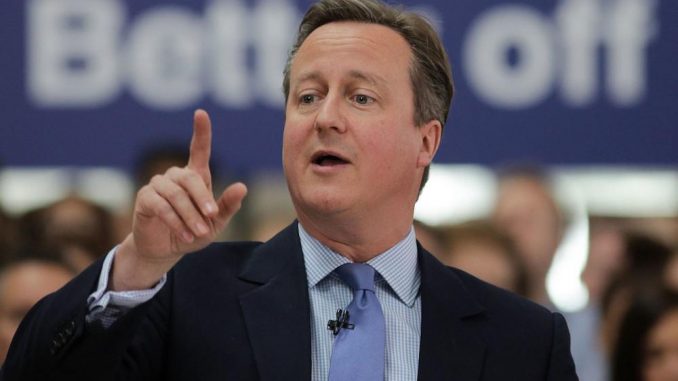
British prime minister David Cameron is trying to fast-track an EU-Canada trade deal without parliamentary consent.
A set of leaked notes that were allegedly made during the EU Foreign Affairs/Trade-Council in Brussels on 13 May, appears to show that the UK is aggressively pushing for a controversial trade between the EU and Canada to be implemented through parliament before MP’s have a chance to vote on the issue.

BYPASS THE CENSORS
Sign up to get unfiltered news delivered straight to your inbox.
You can unsubscribe any time. By subscribing you agree to our Terms of Use
Latest Video
RT reports:
The Comprehensive Economic and Trade Agreement (CETA) is free trade deal between Canada and Europe, which shares many traits with the Transatlantic Trade and Investment Partnership (TTIP) deal being brokered between the EU and US.
Campaigners warn CETA, which has been finalized but not ratified, would pave the way for a “corporate power grab,” while undercutting vital legislation put in place to protect workers’ rights, the environment and consumer safety.
Canada-EU trade deal could sideline Parliament
@M_Star_Online https://t.co/oBE2RDVhLi #CETA #NoTTIP— Nick Dearden (@nickdearden75) May 26, 2016
Leaked minutes of a meeting held on May 13, obtained by UK campaign Global Justice Now (GJN), shed light on recent discussions concerning the agreement. EU ministers gathered in Brussels to review EU trade negotiations and Europe’s steel industry crisis.
The minutes suggest that although the majority of EU states say CETA needs parliamentary approval at home ahead of implementation, Downing Street called for its “earliest possible entry into force.” The governments of a further seven EU states, including Finland, Spain, Estonia, Sweden, Cyprus, Portugal and Lithuania, also took this stance.
‘Corporate power grab’
The CETA talks held in Brussels on May 13 come ahead of a ministerial session scheduled for late June, expected to determine the trade deal’s path of implementation.
Key to the deal is an Investor State Dispute Settlement (ISDS), which would pave the way for Canadian-registered firms to sue sovereign governments across the EU that seek to legislate against their financial interests. An updated version of this corporate court mechanism is also expected to form part of the TTIP.
A controversial tool of international law, the ISDS clause has led to mammoth pay-outs from governments worldwide as corporation’s wage legal battles against states. In one high-profile case, US tobacco giant Philip Morris took legal action against the Australian government after it introduced mandatory plain cigarette packaging.
Although Big Tobacco recently suffered a blow in Britain after the industry lost a high-profile case against Westminster’s plain packaging policy, campaigners warn CETA could shift the balance of power back to corporations.
Why Is Britain Pushing for #CETA Before Parliament Can Vote On It? https://t.co/59LNnuzXdz via @viceuk
— Stop TTIP (@eci_ttip) May 26, 2016
Social justice groups on both sides of the Atlantic are vigorously opposing CETA, which was signed in Ottawa in 2014 following secret talks between Canadian and unelected European Commission (EC) officials.
Global Justice Now (GJN) director Nick Dearden, who campaigns against the free trade deal, called it “inherently undemocratic.”
“Cameron seems perfectly happy to go beyond what the EU requires – he seems to be interested in handing over sovereignty for the sake of it. Again, Britain plays the role of making the EU less, rather than more, democratic,” he said.
“These minutes appear to show that Britain came together with a small group of mostly very small countries to try to deny the right of national parliaments to stop a major international treaty coming into force.”
Dearden went on to argue the agreement could have ominous implications for public interest-based policy-making in the UK.
“Any discussion in Westminster will simply be a rubber stamp,” he said.
“This leaves open the possibility of Britain being sued by Canadian big business in secret courts before parliament has even had the ability to scrutinize the deal.”
Eroded state sovereignty
While CETA will allow corporations to sue EU governments in secret courts known as arbitral tribunals, states across the bloc will not be afforded the same right. CETA will also likely empower US corporate giants to sue national governments through Canadian subsidiaries.
CETA negotiations concluded in August 2014. The agreement awaits approval by the European Council and European Parliament (EP). Whether the trade deal should require backing at parliamentary level by EU states remains under dispute. If passed into law, it would scrap 98 percent of trade tariffs between Canada and the EU.
Both Canada and the EU have long cooperated on an economic level. CETA is Canada’s most prolific trade deal since the North American Free Trade Agreement (NAFTA), signed by the US, Mexico and Canada in 1992.
Despite the 2008 crash and subsequent eurozone crisis, which saw peripheral European states shackled by toxic socialized bank debt and relentless austerity, the EU is still the world’s largest single market. As a unified bloc, it is also Canada’s second biggest trading partner.
CETA will form a direct obstacle to the sort of robust cross-border regulation that could have prevented the 2008 global economic meltdown. Because the deal will lock down deregulation and privatization, it could create fertile conditions for another global economic crisis.
The trade deal’s environmental implications are also a concern. Negotiations to date have laid the groundwork for opening Europe to tar sands oil. Scientists have branded the fossil fuel one of the world’s most environmentally destructive.


